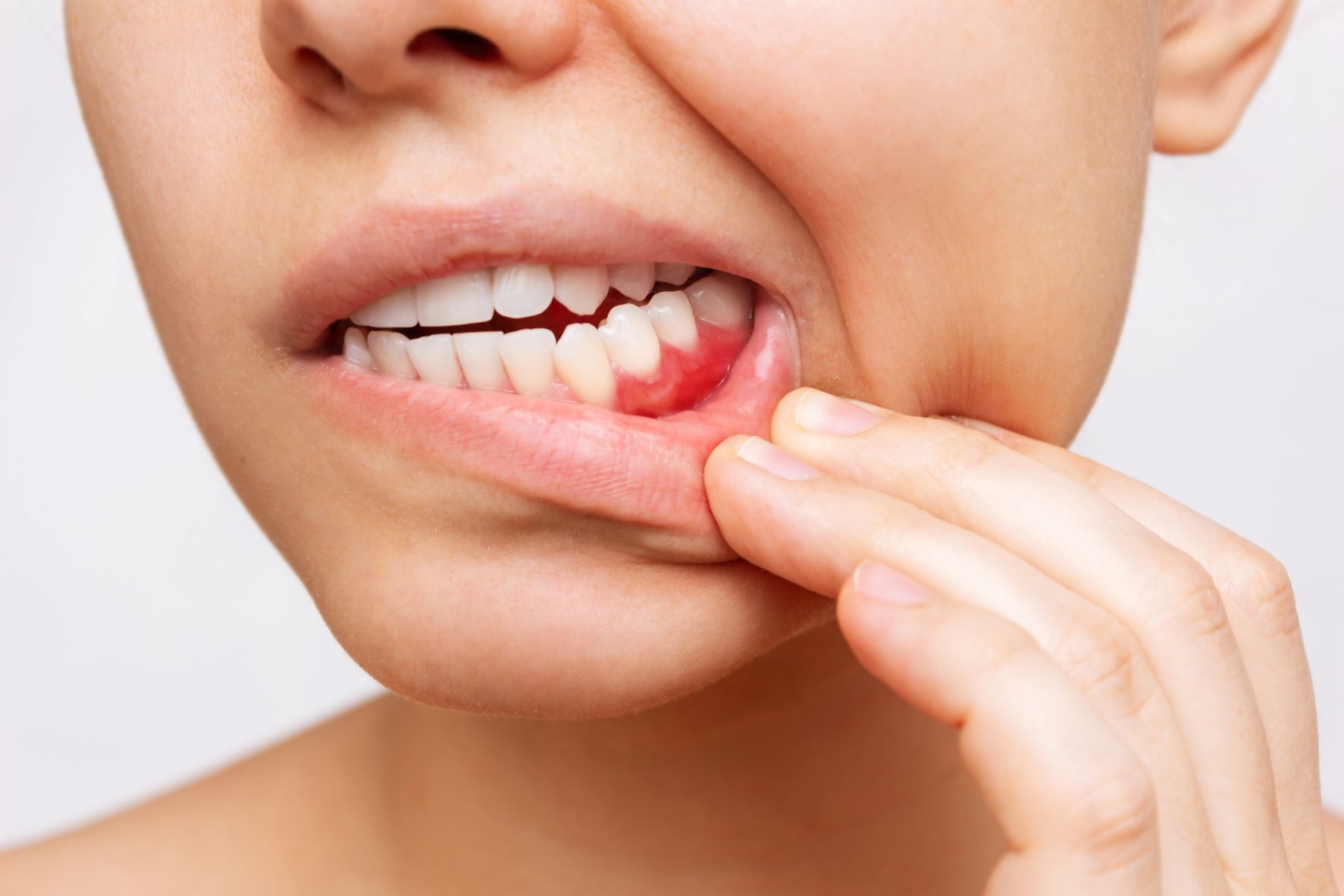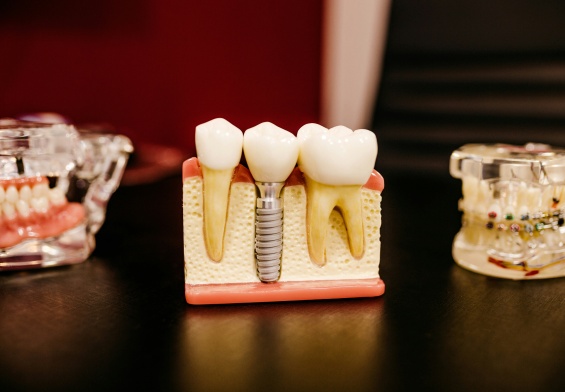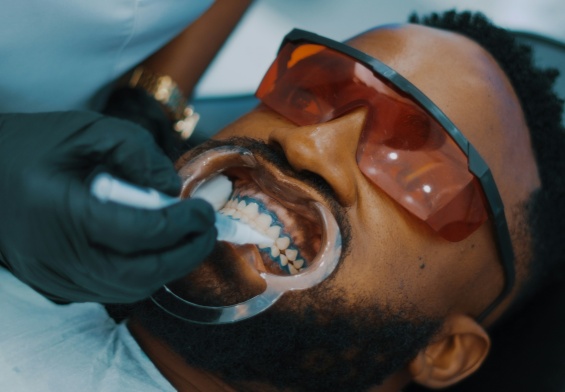Sudden, widespread tooth pain can feel scary, stressful and overwhelming. When all your teeth hurt at once, wondering whether you have a serious problem is only natural.
While this type of pain might suggest a widespread problem, it could also be the result of a localized issue that radiates or affects many teeth at once.
There are several possible culprits behind this kind of discomfort. You might be dealing with dentin hypersensitivity caused by gum recession or enamel erosion.
It could also stem from clenching or grinding your teeth, sinus pressure, or more serious conditions. Sometimes, even a single infected tooth or inflamed nerve can refer pain across your entire mouth.
In this post, we’ll explore the common reasons your teeth might all hurt at once, how to recognize when it’s serious, and what steps you can take to get relief.
What Causes Sudden Pain in All Your Teeth?
Sudden pain in all your teeth may be caused by dentin hypersensitivity, dental trauma, sinus infections, bruxism, or widespread inflammation from gum disease or pulpitis.
Stress, acidic foods, or dental procedures can trigger this pain. Knowing the root cause plays a huge role in getting rid of it.
Several underlying conditions can cause discomfort in many teeth at once:
1. Dentin Hypersensitivity
Exposed dentin from worn enamel or gum recession can lead to sharp, sudden pain when eating or drinking cold, hot, sweet, or acidic items.
Enamel erosion is often caused by acidic foods or overbrushing. Gum recession may result from periodontal disease or going too hard on the brushing.
2. Sinus Infections
Pressure in the maxillary sinus can push against the roots of upper teeth, causing pain that mimics a toothache across several teeth.
This usually develops alongside nasal congestion, sinus pressure, or postnasal drip. All those can come from an upper respiratory infection or seasonal allergies.
3. Bruxism (Teeth Grinding)
Clenching or grinding your teeth, especially at night, can create tension and inflammation in the jaw and surrounding tissues.
Stress, sleep disorders, or misaligned bites are common contributors to this condition.
4. Pulpitis or Decay
Inflammation or infection of the dental pulp (the nerve center inside your tooth) can radiate and make it seem like all your teeth are aching.
Pulpitis is usually triggered by untreated cavities, trauma, or repeated dental procedures.
5. Advanced Gum Disease
Infections or inflammation in the gums can spread, leading to discomfort throughout the mouth.
Poor oral hygiene, plaque buildup, and smoking are common causes of advanced periodontal disease.
These conditions all have different origins, but the one thing they all have in common is that they require prompt treatment. When you get early treatment, you’re preventing long term complications and permanent damage. What begins as manageable sensitivity or inflammation can quickly escalate into infections, tooth loss, or chronic pain.
Is Dentin Hypersensitivity Causing All Your Teeth to Hurt?
Yes, dentin hypersensitivity can cause sudden pain in many teeth. It usually results from exposed dentin reacting to stimuli like temperature changes, sweet foods, or brushing.
Up to 30% of adults experience this condition, often due to gum recession, erosion, or aggressive brushing.
Dentin hypersensitivity usually presents as:
- Quick, sharp pain triggered by cold or hot temperatures
- Sensitivity while brushing or flossing
- Pain when eating acidic or sugary foods
- No obvious visible damage or cavities
Common triggers include drinking iced beverages, eating citrus fruits or sweets, breathing in cold air, or brushing with a toothbrush that’s too hard.
The pain often stops as soon as the stimulus is removed. Meanwhile, pulpitis or infections usually cause lingering, throbbing pain that continues without stimulation.
This kind of pain is surface-level, caused by exposed dentin that has lost its protective enamel or cementum covering.
It’s distinct from deeper or more systemic tooth pain. That often comes from inflammation or damage within the pulp or surrounding structures.
Although dentin hypersensitivity might seem like a minor annoyance, it can worsen over time.
Treating it early can help prevent further enamel loss, nerve irritation, or the development of more serious dental issues.
How Does Inflammation Contribute to Dental Pain?
Inflammation plays a key role in dental pain. When tissue becomes irritated, it releases substances like Substance P. Similar substances increase nerve sensitivity and blood flow, amplifying pain signals.
Substance P is a neuropeptide involved in the pain response. It’s released by sensory nerve fibers in response to irritation or injury and triggers inflammatory events.
It increases blood vessel permeability, attracts immune cells, and makes the pain receptors in surrounding tissues more sensitive.
Substance P levels can rise dramatically during conditions like pulpitis, decay, or trauma. In certain cases, it can increase up to 1,000 times normal levels.
This process can cause pain to radiate beyond a single tooth. As inflammation spreads and nerve fibers become sensitized, even mild stimuli can activate a serious pain response.
That’s why a localized problem, such as a cavity or cracked tooth, can make it feel like several or even all your teeth hurt.
This type of pain differs from mechanical pain (like biting into something hard) or isolated sensitivity.
Inflammation-induced pain tends to be throbbing, spontaneous, and not have an external trigger. It’s also more likely to involve swelling, pressure, or systemic symptoms like fever.
Managing inflammation helps with pain relief and stops the progression of underlying conditions.
Left unchecked, inflammation can damage dental pulp, destroy surrounding tissues, and turn a manageable issue into a serious infection.
Is Sudden Tooth Pain a Dental Emergency?
Sudden tooth pain may be a dental emergency if it involves severe, persistent pain, swelling, fever, or trauma.
A knocked-out tooth, broken crown, or signs of abscess need immediate attention to prevent permanent damage.
There are situations where immediate dental intervention is necessary. These include:
- Severe, throbbing pain that doesn’t improve with over-the-counter medication: This could indicate a serious infection that may spread to the jaw or bloodstream without treatment.
- A knocked-out tooth from trauma or injury: Time is of the essence. Teeth that are replanted within 30–60 minutes have the highest chance of being saved. Immediate care improves the odds of reattachment and reduces long-term complications.
- Broken or lost crowns or fillings that expose the tooth’s inner layers: Exposed dentin and pulp are vulnerable to bacteria, which can lead to rapid infection, intense pain, and even root canal failure.
- Facial or gum swelling accompanied by fever or a bad taste in the mouth: These are classic signs of a spreading infection. Dental abscesses can cause systemic illness and, in rare cases, life-threatening complications.
- Bleeding that doesn’t stop or visibly infected gums: Uncontrolled bleeding or visibly pus-filled gum pockets may indicate advanced periodontal disease or trauma, both of which can worsen quickly and need urgent evaluation.
There are also some issues that may feel urgent but don’t need same-day treatment.
These include mild sensitivity, a small chip in a tooth without pain, or a loose crown that isn’t causing discomfort. While these problems still warrant attention, they’re not really emergencies.
If you do have a true dental emergency and don’t treat it, it can lead to serious complications.
Infections may spread beyond the tooth, and lost or damaged teeth may be impossible to save. When in doubt, call your dentist. They can tell you whether immediate care is needed or help you schedule an appointment.
How Do You Know If It’s Tooth Sensitivity or Something More Serious?
Tooth sensitivity usually causes short bursts of pain triggered by stimuli like cold or brushing. More serious issues cause persistent, throbbing, or spontaneous pain.
If discomfort lingers or is accompanied by swelling, see a dentist for evaluation.
Here’s how to tell the difference:
Sensitivity
Sharp, fleeting pain that happens only in response to a specific stimulus, like cold air, ice water, or sweet foods.
It goes away within seconds after the trigger is removed. It’s commonly caused by exposed dentin from enamel wear, gum recession, or overbrushing.
Pulpitis or Infection
Pain that starts spontaneously or lingers after exposure to hot or cold. It may be dull, throbbing, or intense and doesn’t always respond to pain relievers.
Pulpitis usually develops from deep decay, trauma, or a cracked tooth, and can lead to an abscess if not treated.
Abscess
Severe, deep pain often accompanied by swelling, a foul taste, fever, or visible pus near the gumline.
This signals a bacterial infection that requires prompt dental treatment and possibly antibiotics.
Bruxism (Teeth Grinding)
Dull, aching pain or tooth soreness, especially in the morning or after stress.
The pain is often widespread and may be accompanied by jaw tension, headaches, or tooth wear.
Being able to distinguish between routine sensitivity and signs of infection or nerve involvement helps you get the right care at the right time.
Treating sensitivity with desensitizing toothpaste won’t help a decaying tooth or infected nerve. The longer serious issues go untreated, the more complicated and costly they become.
What Should You Do If All Your Teeth Hurt Suddenly?
If all your teeth hurt at once, don’t ignore it. Even if the pain seems manageable, it could be a sign of something more serious that may get worse without treatment.
Acting early helps prevent further damage and offers faster relief.
Steps to Take When All Your Teeth Hurt:
1. Stop and assess your symptoms
Pay attention to what triggers the pain. Is it cold, heat, pressure, or spontaneous aches?
Take note of whether the pain is short and sharp or dull and persistent.
2. Switch to a soft-bristled toothbrush and non-abrasive toothpaste
If the pain is mild and sensitivity-related, this can reduce irritation and protect enamel and gums from further wear.
3. Avoid acidic, sugary, or extremely hot/cold foods
These can aggravate sensitive teeth and inflamed nerves.
Stick to neutral-temperature, non-irritating foods while symptoms persist.
4. Take over-the-counter pain relievers
Anti-inflammatory medications like ibuprofen can help reduce discomfort and swelling until you can get to the dentist.
5. Call your dentist
If the pain is persistent, severe, or comes with swelling, bleeding, or fever, don’t wait.
Schedule an emergency appointment to determine the root cause and get appropriate treatment.
Tooth pain that affects your entire mouth is rarely random. Whether it’s caused by nerve inflammation, infection, bruxism, or gum disease, prompt evaluation by a dental professional can identify the exact cause and stop the problem from escalating.
Often, early intervention also means simpler, less invasive treatment.
Sudden Teeth Sensitivity FAQs
Why do all my teeth hurt suddenly?
Sudden pain in all your teeth is often caused by dentin hypersensitivity, bruxism, sinus pressure, or widespread inflammation like pulpitis or gum disease.
These issues can affect many teeth at once and should be evaluated by a dentist, especially if the pain is severe or doesn’t go away.
Can stress cause all your teeth to hurt?
Yes. Stress can lead to teeth grinding or clenching (bruxism), which strains the jaw and inflames the nerves supporting your teeth.
This can make many teeth feel sore, especially in the morning. A night guard or stress management techniques can help relieve symptoms.
Can a single tooth problem make all my teeth hurt?
Yes. A cracked tooth or deep cavity can trigger widespread nerve inflammation or referred pain, making it feel like it’s affecting all your teeth.
This is especially common with pulpitis or when the trigeminal nerve is involved. A dentist can pinpoint the true source.
When to Take Sudden Tooth Pain Seriously
If all your teeth hurt suddenly, it’s not something to ignore. Whether it’s due to sensitivity, nerve inflammation, or a hidden infection, widespread tooth pain usually points to an issue that needs attention.
While some causes are temporary or manageable at home, others can lead to lasting damage if left untreated.
The sooner you identify the cause, the easier and more comfortable treatment will be.
Don’t wait for the pain to go away on its own. Call your dentist, describe your symptoms, and get the relief you need.
Early care protects your oral health and prevents more serious (and expensive) problems later on.
Resources
Sacerdote, Paola, Levrini, Luca, Peripheral Mechanisms of Dental Pain: The Role of Substance P, Mediators of Inflammation, 2012, 951920, 6 pages, 2012. https://doi.org/10.1155/2012/951920
Splieth, C.H., Tachou, A. Epidemiology of dentin hypersensitivity. Clin Oral Invest 17 (Suppl 1), 3–8 (2013). https://doi.org/10.1007/s00784-012-0889-8




